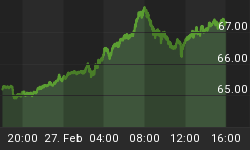The lack of major economic reports today means the direction of the Dollar is likely to exert more influence on the U.S. equity markets. With the Dollar up overnight because of risk aversion, traders are selling equities. Yesterday's tight trading range and lack of follow through during the New York session may have been indications that the stock markets are overbought. The daily March E-mini S&P chart suggests that a break through 1128.75 may accelerate the move to the downside.
June Treasury Bonds are trading better overnight as traders shift money out of higher risk assets and into the lower-yielding, lower-risk Treasuries. In addition, short term support has been reached at a 50% level at 116'04.
April Gold is feeling pressure because of the stronger Dollar. In addition, a report that China may be buying less gold in the future is hurting demand for the precious metal. This morning, gold is testing minor support at $1117.20. A break through this level could trigger a further break to $1110.40.
The strengthening Dollar and weaker demand for higher risk commodities triggered a hard sell-off in June Crude Oil overnight. Overbought conditions may also be contributing to this weakness. The daily chart indicates that a key uptrending Gann angle has been broken. This could trigger the start of a further decline to 79.50 over the near-term.
The U.S. Dollar is trading higher this morning against most major currencies except the Japanese Yen as traders have turned against risk and are seeking shelter in lower yielding assets. The overnight strength in the Dollar is being attributed to heavy selling pressure on the March Euro and March British Pound.
The Euro is down as traders are taking a more cautious view of the Euro Region economy now that the fiscal problems in Greece have subsided. Traders are citing the possibility of an uneven recovery in the economy as one of the reasons for the weakness. They are worried that the European Central Bank faces too many upcoming challenges regarding growth and inflation to trigger a reasonable appreciation in the Euro.
Another concern for traders is the possibility that the recent Greek budget cuts will fail to shore up their deficit situation. This is why Greek officials are pushing for the European Union to provide backing in the form of a bailout package should the need arise to support the Greek economy. Yesterday, German Chancellor Angela Merkel said that such a proposal is not on the table, citing an EU agreement that prevents a bailout.
The overnight weakness indicates that traders have already discounted last weekend's friendly comments from the French stating that the EU stands ready to support Greece if necessary. In addition, although net short positions in the recent CFTC Commitment of Traders Report fell during the last week, last night's sell-off indicates there is still plenty of interest in the short side of the market from larger well-funded hedge funds.
Today, Greek Prime Minister Papadreou meets with President Obama. He's not here to discuss the possibility of U.S. aid, but instead wants the U.S. regulators to open up an investigation into Euro market manipulation and excessive speculation. The lack of any major economic news this morning could mean that regulatory headlines could move the markets intraday.
The March British Pound is extending its weakness from Monday after Fitch Ratings issued a cautious outlook for the U.K. economy. Besides the possibility of a credit rating cut by the credit reporting agencies, bearish traders are citing political uncertainty and a dovish stance by the Bank of England as other reasons for the weakness.
Another reason for the recent decline in the British Pound is the lack of trust with the Bank of England. Recently, BoE member Kate Barker said that the economic recovery in the U.K. is "broadly on track". She did add that the economy faces a "bumpy" road because of high unemployment and tight credit markets. Recent economic reports indicate that her assessment is a little skewed.
This morning it was reported that the RICS House Price Balance Index fell short of expectations. In addition, UK trade data was disappointing and cast doubts over the economic recovery.
The renewal of risk aversion is helping to support the March Japanese Yen this morning. Japanese investors are also becoming concerned that the recent rise in the Japanese Yen will hurt its export market. The break in the Euro is helping to pressure the March Swiss Franc. Investors are once again becoming concerned that the Swiss National Bank may have to intervene to weaken its currency versus the Euro. The SNB is mandated to protect its export market which accounts for up to 50% of its total economy.
The shift in risk sentiment means less demand for commodity-linked currencies such as the Canadian Dollar, Australian Dollar and New Zealand Dollar. Lower gold and a huge overnight drop in crude oil are helping to weaken the March Canadian Dollar. This break has also been triggered by grossly overbought conditions.
The Australian Dollar is feeling downside pressure this morning as traders dump higher yielding assets. Losses could be limited by the news that the National Australia Bank Business Confidence Index rose 4 points in February. Downside pressure is driving the New Zealand Dollar down once again. Later this week, the Reserve Bank of New Zealand is expected to leave its benchmark interest rate unchanged. The poor economy is likely to mean that the RBNZ will not even consider a rate hike until late in the year or after the economy shows sustained growth.















